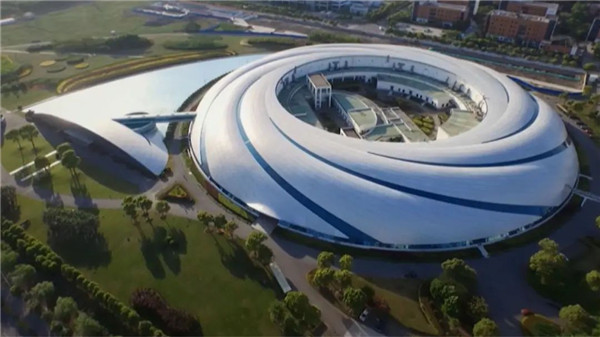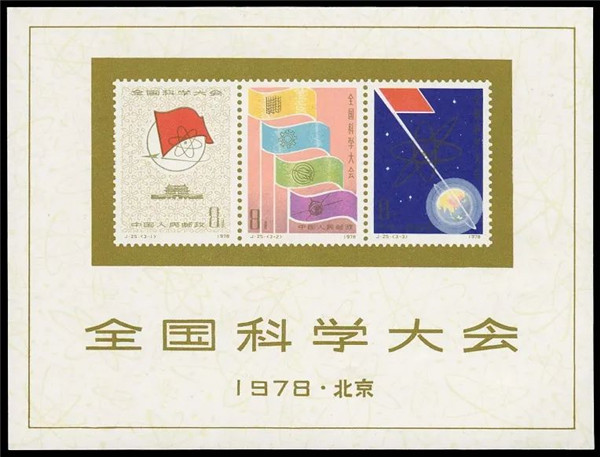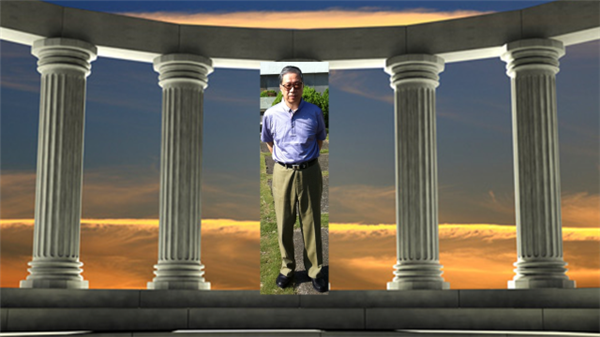Fujia Yang (杨福家) :The Global Intellect that I know
July 26 , 2023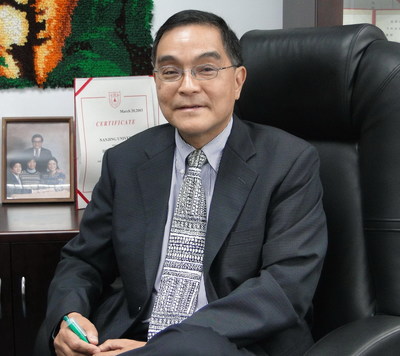
By Da Hsuan Feng, academic advisor of Center for China and Globalization (CCG), Chairman of Hainan University International Advisory Board, Honorary Dean of the Belt and Road Research Institute and former Vice President for Research at the University of Texas at Dallas.
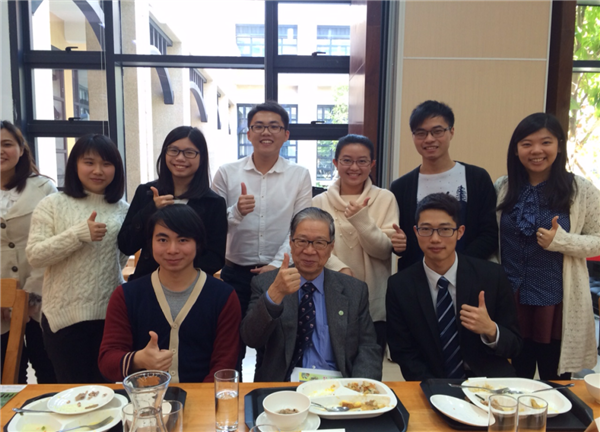 Academician Fujia Yang in his most favorite setting: Having a simple lunch with students from one of the University of Macau’s Residential Colleges
Academician Fujia Yang in his most favorite setting: Having a simple lunch with students from one of the University of Macau’s Residential Colleges
Friends from the world, I am both deeply honored and profoundly sad that I am making this comment about my friend Yang Fujia, whom I have known since 1979 when we were both at the Niels Bohr Institute in Copenhagen. Some of the content in this comment was lifted from a speech I delivered in honor of his 80th birthday celebration in Shanghai.
My friends, this is not an easy task. First of all, Fujia’s lifetime accomplishments, such as his leadership in science, education (he was Fudan University’s President, he was the first Chinese to assume the Chancellorship of Nottingham University and the Founding President of Nottingham University Ningbo, China. Last but not least, he was one of the developers of China’s synchrotron research. For all the above reasons, and more, I thought the best way to characterize Fujia as a global intellect!
For his interest in synchrotron research, it is clearly a manifestation that in science, Fujia’s interests are broad and deep. Couple with his vast administrative and highly nontrivial funding seeking abilities, he was able to ensure the construction of this complex experimental facility known as Shanghai’s Synchrotron Radiation center we now see erected boldly in Pudong, Shanghai.
I should also say that Fujia’s scientific interest is more intellectual than field-related. In fact, not being involved in any research areas related to synchrotron radiation, he only had a deep and broad interest in how such a facility could enhance human’s knowledge about materials, both physical and biological. Indeed, before the Pudong facility was created, China only had a rudimentary facility which was piggy banked on the Electron-Positron Collider in the Institute of High Energy Physics in Beijing. Seeing this shortcoming, Fujia together with the late Academician Xian Dingchang, clearly inherent felt that if China were to contribute to this important field for humanity, it must have a world-class facility.
China opened up to the world in 1977. Soon after I had the honor of meeting and knowing him. I dare say that he became my intellectual mentor in the broadest sense of the word. If my memory serves me right, somehow through Academician Zu-qia Wang (黄祖洽) of Peking Normal University (北京師範大學, ) I was connected to Fujia almost immediately after China opened up.
In the past 42 years, I have had many personal and professional interactions with Fujia. In hindsight, those interactions certainly shaped my career as a scientist and later as a university administrator. For that, I am deeply grateful. So today, please allow me to tell you two such interactions and the lessons, and I hope some wisdom, I and everyone else could derive from them.
Lesson 1: Learn to Ask Questions (学问)
For the second half of his career, Fujia became deeply engaged in education reform, especially higher education reform. This is a well-known fact and there is no need for me to belabor it here.
As I mentioned, Fujia has a sharp and focused mind. One of his great strengths is that he wastes no words and goes right to the point. He said often in his speeches that students need to Xue Wen (or学问), the Chinese phrase for “knowledge” which literally means “LEARN TO ASK.”
Another characteristic of Fujia is that somehow, he is a personification of the amalgamation of East and West. He is perceived by the world to be a “Global Citizen.” Yet at the same time, one must not be confused that his Chinese heritage (especially his Shanghai heritage) oozes out of him! He does ask questions, but usually pointedly but politely. With that, he always can get the best answer.
The best example of the above characteristic of Fujia was in 1993, when the then Israeli Prime Minister, the late Itzhak Rabin visited Fudan University. There was a famous dialogue between Rabin and Fujia.
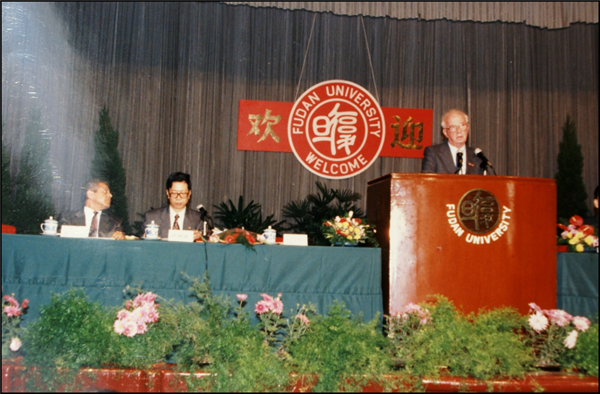 Fujia welcoming Rabin at the Dinner Banquet of Fudan University
Fujia welcoming Rabin at the Dinner Banquet of Fudan University
Fujia: “Your Excellency, it is well known that your country does not possess a drop of fossil fuel underneath the land. How could your country become the bread basket and high technology center of the Middle East?”
Without the slightest hesitation, Rabid answered: “Because we have seven world-class universities.”
This dialogue tells me two things about Fujia. First, whenever he meets someone for the first time, he always does his homework about that person a priori. Clearly, in order to receive Rabin, Fujia did enough homework about Israel. Second, Fujia is very comfortable with foreigners, and in return, foreigners are very comfortable with him. He is even comfortable with foreign dignitaries, such as Rabin. Only possessing sufficient comfort level was he able to ask what may appear to be an “impolite” question, without being impolite.
In hindsight, by asking a very good and penetrating question, Fujia actually extracted a great answer from Rabin whose implication was clearly just as important to China as it was to Israel!
My friends, one cannot help but be impressed by Rabin’s quick answer. However, wouldn’t you not agree with me that if it were not because Fujia asked the right question, and thus set the stage for Rabin, would we get such a succinct answer about the fundamental importance of higher education?
It is often we hear people saying so and so gave a “great answer!” What we hear less often, in fact almost never, is “that was a great question!” Indeed, Fujia did ask a great question, or Xue Wen (or学问)!
From the Rabin – Yang dialogue, when Yang set the stage by asking such a question, the answer of Rabin, great as it was, was really the only one he could give! I think there is no doubt in my mind that the question by Fujia was clearly just as, if not more important than the answer by Rabin.
Lesson 2: Public Policies
In 1979, as a naive and young Assistant Professor of Physics, launching my career in nuclear physics at Drexel University, I went to the Niels Bohr Institute in the University of Copenhagen. There I met Fujia and his wife, Teacher Peng (彭老師) in person for the first time. Of course, as many of you know, to be able to have one’s spouse joining the trip at that point of time in China was something truly unusual. That alone tells me that Fujia was a man of unusual character.
As all of you know, from 1966 to 1976, China suffered through 10 horrific years of Cultural Revolution. In 1978, there was a globally well publicized conference held in Beijing whose theme was “National Reconstruction through Science.”
As a young physicist, the Beijing conference of 1978 greatly attracted my intellectual curiosity and excitement.
I should preamble this by letting you know that prior to 1972, the year I received my Ph.D. in theoretical physics from the University of Minnesota, China, Chinese physics, was for me essentially a blur, if not a black-hole.
From 1972 to 1974, I was a postdoctoral fellow at the Department of Theoretical Physics of the University of Manchester. It was there that I first saw in its departmental library a subscription to the Acta Physica Sinica (物理学报), something I did not know that it even existed! Only by reading this journal then that I came to the realization that physics was not only existed in China, it was actually quite prominent! Therefore, when China opened up in 1977, I literally experienced a breath of mental fresh air, and I became even more eager to deepen my understanding of China and Chinese science.
For the above reason, you could imagine my excitement I had when my host at the Bohr Institute informed me prior to my arrival that there will be a group of scientists sent from China to the Bohr Institute.
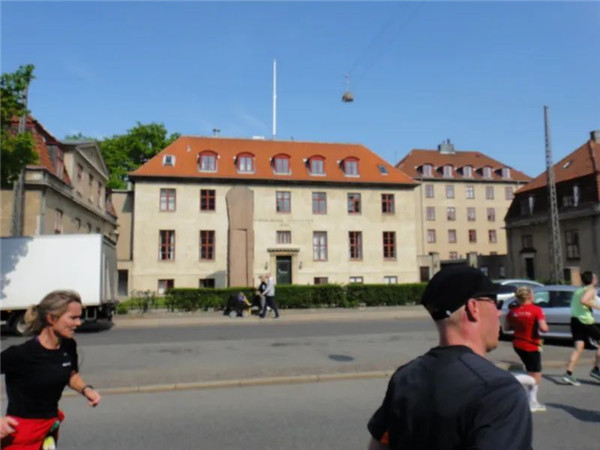 A recent photo of the Niels Bohr Institute. It looks exactly like it did 40 years ago! It is the best example of “great science is from people, not from great building!”
A recent photo of the Niels Bohr Institute. It looks exactly like it did 40 years ago! It is the best example of “great science is from people, not from great building!”
The person who was handling the Chinese visitors’ logistics obvious did not know the members of the group. She wanted me to be of assistance in case these visitors have language difficulties. As it turns out, all the visitors were fluent in English. In fact, one of them, Academician and now the late Xian Dingchang (冼鼎昌,) was fluent in Russian as well! I became lifelong friends with all and Fujia and Teacher Peng are two such individuals.
The Bohr Institute, the Mecca of nuclear physics was, and I am sure still is, a place where scientists from all corners of the world would converge to and was the platform to discuss openly scientific issues without any sense of “professional authority.”
I recall one important short conversation over lunch at the Bohr Institute I had with Fujia. That conversation literally shaped my thinking about higher education many decades later.
As I mentioned earlier, I was very interested in the 1978 Beijing Conference. So I remember my conversation with Fujia was as follows:
“Professor Yang, it is so exciting to hear about the Chinese Science Conference in Beijing last year that science will play a role in China’s reconstruction (I remember I specifically left out the phrase The Great Cultural Revolution because I was not sure whether it was Kosher to mention that term then to someone who just came from China!)”
His answer startled me. In what I learned later on was his style of conversation, direct and to the point. He said: “Science cannot rebuild China. Proper public policies can rebuild China,” he concluded.
My friends, you can imagine that I was quite taken aback by such a terse answer. It was not at all what I expected. Frankly, I was expecting Fujia to agree with me about a Chinese national excitement of a “Spring of Chinese Science” (中国科学的春天). Mind you, at that moment, the term “public policies, 公共政策” was not in my Chinese or English vocabulary. I had no follow-up to that answer and therefore the discussion was dropped.
Fast forward to 1997. At that time, I was involved working with a United States Congressman named Curt Weldon on various technical projects. Weldon was then the Congressman from my home district in the suburb of Philadelphia. As we became more familiar with one another, Weldon and I had many conversations on a variety of subjects. I remember Weldon said to me one day something to the following effect:
“You know, Da Hsuan, politics is public policies personification! When the United States Congress makes “laws,” of “rulings,” hopefully we de facto are instituting public policies for social good and that the society must obey. Of course, such public policies are the results of ethical, humane and culminating social and political habits.”
 Professor and Mrs. Yang visiting Congressman Curt Weldon’s office in the United States Congress
Professor and Mrs. Yang visiting Congressman Curt Weldon’s office in the United States Congress
When Weldon said that, I recall at that moment, I suddenly remember that two decades ago, the term “public policies” was uttered by Fujia. It suddenly dawned on me what Fujia meant. He was telling me that for China to make progress, the nation must institute “public policies” which fit the “social and political habits” of the nation. As Weldon said, public policies must be a result of a deep understanding of the social and political habits and must be beneficial to the nation at large.
So, it dawned on me, right then and there, 20 years after what Fujia said to me in Copenhagen, that “for national reconstruction, public policies are the reasons and science is simply a tool!” To put science before public policies is de facto putting the cart before the horse!
My friends, nearly all global challenges humanity is facing today, human hatred, geopolitical uncertainties, energy challenges, climate changes, population explosion, and so on and so forth, are the results of poor public policies for the past century, or centuries. It also dawned on me that today higher education globally, and for sure in Asia Pacific, maybe missing the boat by not creating a “public policy ambiance” for our faculty and students in the many aspiring higher education institutions.
This was indeed a fundamental and profound lesson, slowly as it is, I learned from Fujia! It literally altered my thinking about higher education in the past three decades.
Epilogue
The two “simple” examples I mentioned in this discussion are the tip of an iceberg of Fujia’s powerful global intellectual character. In a greater context, Fujia is not an isolated case but a member of a large and powerful group of Chinese intellectuals.
Friends, in another context I had written the following:
“1976 was a defining year for modern China. Chairman Mao died on Sept. 9 that year, followed immediately by the spectacular collapse of the so-called “Gang of Four”, thus bringing closure to ten painful years of “Cultural Revolutions”, and ushered China into a new era. Someday, historians will undoubtedly consider the new era as the “miracle of the world in the 20th century”.
In 1976, after a decade of utter devastation, China was at the verge of a complete “meltdown”, economically, technologically and intellectually. Having quarter humanity, and a land size spanning nearly half of Asia, such a meltdown would have horrifying global implications!
Yet, no meltdown occurred.
A fundamental reason why there was no meltdown was because of the Herculean contributions of the tens of millions of Chinese intellectuals. In their darkest hours during that era, enduring the hardest of hardships and suffering the deepest personal humiliations, they always maintained palpable hope for themselves, their family, their professions and their nation. Indeed, even without personal liberty, both physically and mentally, they remained important pillars of the nation, holding up its dignity. The successes of China of the 21st century is in no small part due to this group of individuals.”
There is no question in my mind that Fujia Yang is one of the pillars I mentioned in this writing.
As we remember Fujia’s life time contributions to humanity, we must ensure what he had achieved should not and must not fade away in time. This is not just for Fujia as a person, for Fujia as a Chinese global intellect, but in general in these hours of great humanity need!
Topical News See more

